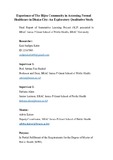Experience of the hijra community in accessing formal healthcare in Dhaka city: an exploratory qualitative study

View/Open
Date
2023Publisher
Brac UniversityAuthor
Kabir, Kazi SudiptaMetadata
Show full item recordAbstract
Introduction: The Hijra community experience social exclusion in Bangladesh.
One of the key aspects of life is health. It is the right of the general population of
a country to access formal healthcare services at the public and private healthcare
facilities. The people of the Hijra community face numerous discriminatory
challenges in accessing health services at the hospitals and other community
clinics due to gender disparity even after they are legally recognized by the
government at the ‘Third Gender’.
Objective: To understand the experiences of the Hijra community members in
accessing formal healthcare services.
Method: An exploratory qualitative method comprising of 26 In Depth
Interviews (IDIs) and 5 Key Informant Interviews (KIIs) were conducted among
the Hijra persons residing in different locations of Dhaka city. The data were
analyzed by using coding strategies and thematic analysis.
Finding: The study findings revealed that the Hijra people commonly experience
cold, fever, allergy, non-communicable diseases (NCDs), sexually transmitted
infections (STIs) and insomnia. However, seeking formal healthcare for the
mentioned health issues is a challenging experience for them due to lack of
service provision for the third genders in the hospital premises, negligence and
refusal to provide services by the care providers, verbal and physical harassment
by the service providers and surrounding people.
Conclusion: The study shows the need to sensitize the society and incorporate
Hijra identity (third gender) within the administrative service provision of the
formal healthcare facilities alongside the ‘male’ and ‘female’ gender categories. It
also recommends improving the knowledge and attitude of the care providers
towards the Hijra community by familiarizing them with their biological and
cultural aspects to avoid further discrimination and humiliation when seeking for
formal healthcare in future.
